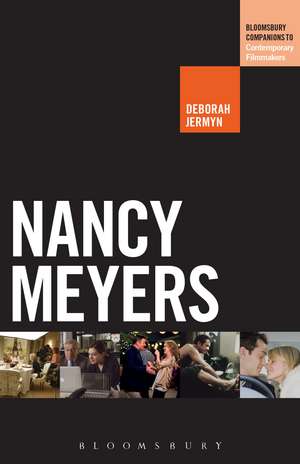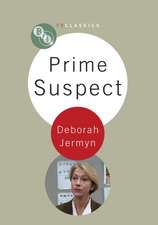Nancy Meyers: The Bloomsbury Companions to Contemporary Filmmakers
Autor Deborah Jermynen Limba Engleză Paperback – 30 oct 2019
| Toate formatele și edițiile | Preț | Express |
|---|---|---|
| Paperback (1) | 167.54 lei 6-8 săpt. | |
| Bloomsbury Publishing – 30 oct 2019 | 167.54 lei 6-8 săpt. | |
| Hardback (1) | 814.68 lei 6-8 săpt. | |
| Bloomsbury Publishing – 26 iul 2017 | 814.68 lei 6-8 săpt. |
Preț: 167.54 lei
Preț vechi: 297.28 lei
-44% Nou
Puncte Express: 251
Preț estimativ în valută:
32.06€ • 34.28$ • 26.73£
32.06€ • 34.28$ • 26.73£
Carte tipărită la comandă
Livrare economică 17 aprilie-01 mai
Preluare comenzi: 021 569.72.76
Specificații
ISBN-13: 9781501358906
ISBN-10: 1501358901
Pagini: 272
Ilustrații: 16 bw illus
Dimensiuni: 152 x 229 x 20 mm
Greutate: 0.36 kg
Editura: Bloomsbury Publishing
Colecția Bloomsbury Academic
Seria The Bloomsbury Companions to Contemporary Filmmakers
Locul publicării:New York, United States
ISBN-10: 1501358901
Pagini: 272
Ilustrații: 16 bw illus
Dimensiuni: 152 x 229 x 20 mm
Greutate: 0.36 kg
Editura: Bloomsbury Publishing
Colecția Bloomsbury Academic
Seria The Bloomsbury Companions to Contemporary Filmmakers
Locul publicării:New York, United States
Caracteristici
Includes an A-Z guide, key collaborations and original essays providing new critical responses to Meyers
Notă biografică
Deborah Jermyn is a Reader in Film and Television at Roehampton University, UK. She is the author and editor of numerous books exploring women, feminism and popular culture including Female Celebrity and Ageing: Back in the Spotlight (2013), Sex and the City (2009) and Hollywood Transgressor: The Cinema of Kathryn Bigelow (2003).
Cuprins
List of illustrationsAcknowledgementsPrefaceIntroduction: Women, Hollywood and the Politics of the Popular1. KEY COLLABORATIVE RELATIONSHIPSMeet The Shmeyers: Meyers as writer-producer and the 'writing couple' leitmotif2. WAYS OF WATCHINGThe Romcom Queen: Gender, genre and cultural value3. RETHINKING AUTHORSHIPThe wrong kind of woman filmmaker?: Meyers, feminism, and the quandaries of the female auteur4. KEY CONCEPTS'Your age is my favourite thing about you': Meyers' older women and the gendered experience of ageingConclusionBibliography Index
Recenzii
Jermyn's book is much more than a carefully researched, well written and brilliantly argued study of Nancy Meyers. In providing her analysis with a multiplicity of well-chosen contexts --postfeminist culture, the politics of the popular, the hidden complexities of romantic comedy-- she ends up contributing as much to those contexts as to the work of the Hollywood director. Both passionate and nuanced, this is film scholarship at its very best.
Timely and well overdue, Jermyn's monograph thoroughly examines writer/director/producer Nancy Meyers's oeuvre. To this date and despite a long and successful career, Meyers has still not found a place in either film history or studies of authorship that are unfortunately stories of male cinematic success, or studies of "women's" cinema that tend to avoid and/or "suspect" female mainstream filmmaking. Delving into rich archival material and based on insightful textual analysis, Jermyn poignantly proves not only that Meyers could easily be placed among the revered male auteurs of contemporary American cinema (although this is not her aim) and that her place in post-classical Hollywood history is unquestionable but also how her career and cultural outputs have been diminished exactly because of her gender and the female characters she has created. At a time when Hollywood is more than ever invested in simplistic franchise productions despite increasing outcry against this obvious discrimination, Jermyn's study is a most valuable work that should complement the reading lists of many a film, media and gender studies syllabus.
Nancy Meyers' films are easily and often dismissed for their visual allure and aspirational aesthetics. (A hint of their complexity, though, may lie in these films' awareness of a truth we don't want to hear, namely that a key form of contemporary intimacy is our relationship with our possessions and ability to "stage" them). Deborah Jermyn rigorously and compellingly elicits a set of counter-evidence to the "standard line" on Meyers' work; this lively, engaging and highly readable work exemplifies the very best kind of high-quality film studies scholarship.
Deborah Jermyn argues for Nancy Meyers not as a feminist auteur but as an auteur that feminists need to think about. And it's fun to think through the questions Jermyn explores in this book, from the lowly status of rom coms to the meanings of auteurism itself. Jermyn wittily calls out and thinks critically about her own strategies of analysis, offering a savvy model of film scholarship as well as an engaging reading of movies we now need to see again.
Timely and well overdue, Jermyn's monograph thoroughly examines writer/director/producer Nancy Meyers's oeuvre. To this date and despite a long and successful career, Meyers has still not found a place in either film history or studies of authorship that are unfortunately stories of male cinematic success, or studies of "women's" cinema that tend to avoid and/or "suspect" female mainstream filmmaking. Delving into rich archival material and based on insightful textual analysis, Jermyn poignantly proves not only that Meyers could easily be placed among the revered male auteurs of contemporary American cinema (although this is not her aim) and that her place in post-classical Hollywood history is unquestionable but also how her career and cultural outputs have been diminished exactly because of her gender and the female characters she has created. At a time when Hollywood is more than ever invested in simplistic franchise productions despite increasing outcry against this obvious discrimination, Jermyn's study is a most valuable work that should complement the reading lists of many a film, media and gender studies syllabus.
Nancy Meyers' films are easily and often dismissed for their visual allure and aspirational aesthetics. (A hint of their complexity, though, may lie in these films' awareness of a truth we don't want to hear, namely that a key form of contemporary intimacy is our relationship with our possessions and ability to "stage" them). Deborah Jermyn rigorously and compellingly elicits a set of counter-evidence to the "standard line" on Meyers' work; this lively, engaging and highly readable work exemplifies the very best kind of high-quality film studies scholarship.
Deborah Jermyn argues for Nancy Meyers not as a feminist auteur but as an auteur that feminists need to think about. And it's fun to think through the questions Jermyn explores in this book, from the lowly status of rom coms to the meanings of auteurism itself. Jermyn wittily calls out and thinks critically about her own strategies of analysis, offering a savvy model of film scholarship as well as an engaging reading of movies we now need to see again.












